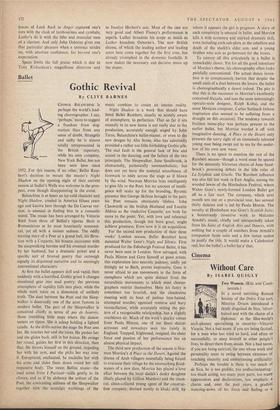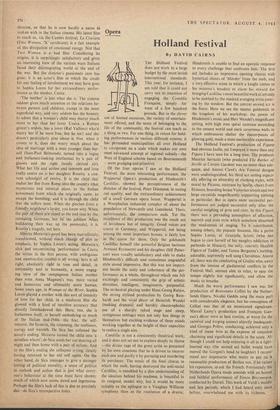Cinema
Without Care
By ISABEL QUIGLY
Two Women. (Ritz and Conti- nentale.) IN a novel satirising Roman Society of the Dolce Vita sort, Maurice Druon introduced a thinly disguised de Sica, 'silver- haired and with the charm of a diplomat,' as the film-world's arch-phoney specialising in sincerity—Vittorio Vicaria. Not a bad name, if you are being factual, for a man who has tried so hard, and often so successfully, to steep himself in other people's lives, to direct them from inside. Not a bad name, if you are being satirical, for one whose work and personality seem to swing between extremes of touching sincerity and embarrassing artificiality. Perhaps the trouble is there is too much of de Sica, he is too prolific, too undiscriminating : too much acting, too many poor parts, too many appearances and declarations, too emphatic a charm and, over the past years, a gradual watering-down of his force and feeling as a director, so that he is now hardly a name to reckon with in the Italian cinema. His latest film to reach us, via the Cannes festival, La Ciociara (Two Women, 'X' certificate), is a fair example of this dissipation of emotional energy. Not that Two Women is a bad film. Considering its origins, it is surprisingly satisfactory and gives an interesting view of the various ways Italians faced their disintegrating world at the end of the war. But the director's passionate care has gone; it is an actor's film in which the credit for any feeling of involvement we may have goes to Sophia Loren for her extraordinary perfor- mance as the mother, Cesira The mother' is just what she is. The cinema seldom gives, much attention to the relations be- tween parents and children, except in the most superficial way, and very seldom has the honesty to admit that a woman's child may matter much more to her than her lover Cesira, a Roman grocer's widow, has a lover (Raf Vallone.) who'd marry her if he were:free,- but be isn't and she doesn't particularly pine about it. Nor, when it comes to it, does she worry much about the idea of marriage with a man younger than her- self (Jean-Paul Belmondo, turned into a vague, and Italianate-looking intellectual by a pair of glasses and the right faintly clerical air). What her life and action and interests and love really centre on is her daughter Rosetta, a con- vent schoolgirl of twelve. It is, the child that makes her flee from Rome into the country (that mysterious and inimical place, to the Italian townsman) from which she originally came, to escape the bombing; and it is through the child that she suffers most. When she pinches from a friendly neighbour's larder, you know why. When the pair of them are raped at the end (not by the retreating Germans, 'but by the jubilant Allies bulldozing their way up the peninsula), it is Rosetta's tragedy, not hers.
Alberto Moravia's novel has, been marvellously; transformed, without much change Off plot or emphasis, by Sophia Loren's acting. Moravia's, slick and unconvincing `performance' as Cesira (he writes in the first person, with ambiguous and unattractive results) is all wrong; hers is all right, absolutely right in tone and detail, in nationality and in humanity, a more engag- ing view of the rampageous Italian mother than even Anna Magnani's was, more varied and humorous and ultimately more human. Some years ago, in Woman of the River, Sophia Loren played a mother with this sort of intensity of love for her child; in a mediocre film she glowed with a kind of intuitive accuracy that directly foreshadowed this. Here, too, she is ltalianness itself, in herself embodying so much of the Italian mid-1940s--the fear, the self- interest, the hysteria, the trimming, the resilience, energy and warmth. De Sica has softened the novel's ending. Moravia turned the child into `a mindless whore'; de Sica sends her out dancing all night and then home with a pair of nylons. And in the film's ending she collapses crying, clearly having returned to her old self again. On the other hand, de Sica manages to give a stronger feeling of political morality, a sense of politics in outlook and action that is just what every- one's behaviour at the time must have shown; much of which now seems dated and ingenuous. Perhaps the film's lack of fire is due to precisely this—de Sica's retrospective irony.



































 Previous page
Previous page